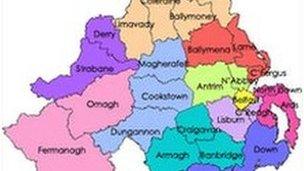New 'super-councils' legislation to be debated at Stormont
- Published
- comments

Northern Ireland's 26 councils are being replaced by 11 super councils
Assembly members are due to debate the next week - the measure which sets out how the planned 11 councils will function.
The elections to the new 'super councils' are expected to take place on 22 May next year, the same day as the European elections.
So on the face of it, the timetable for this bill looks very tight.
Officials hope the bill will make it through all its stages by February or March, but point out that even if there is a hold up, the council elections can go ahead, in any case, in May.
Assuming the elections happen, there will then follow a slightly strange shadow year in which two councils will operate in parallel.
The outgoing 26 councils will continue to carry out their current work, while the 11 incoming councils will sort out where their headquarters will be, how they will take decisions and what level of rates they will set.
Nationalists will be in a majority in western councils and unionists in eastern districts.
But given the size of the new councils almost all of them will include substantial minorities.
With that in mind, the Local Government Bill contains measures intended to protect minorities.
These include rules on sharing out important posts on a council and a procedure by which 15% of councillors can "call in" a decision for further consideration.
Flags
There is a clause specifying that certain votes will have to be passed with an 80% majority.
There is also a reference to decisions that "would disproportionately affect adversely any section of the inhabitants of the district", and a requirement for a barrister or solicitor to verify exactly what such a matter might be.
Given the history of recent months at Belfast City Council an obvious question arises.
Should decisions about which flags will fly over the new 11 council headquarters be subjected to "call ins" and 80% votes? If so which flag would command the necessary consensus?
The new Local Government Bill does not answer the question.
Instead, the plan is to specify those areas to which 80% votes and call ins might apply in the councils' statutory rules.
Provisions governing those rules are due to be contained in what is known as subordinate legislation, which is still being worked on.
These orders will be passed by the assembly under what's known as "draft affirmative procedure".
Ordinarily do not attract a great deal of attention. But these ones are likely to prove an exception.